- Home
- Charles de Lint
Angel of Darkness Page 4
Angel of Darkness Read online
Page 4
“What do you think?” he said gruffly.
He left the porch before Dwyer could respond.
6
WALTER HAWKINS FELT like a TV private eye as he slouched in his old Chevy, waiting for the restaurant to close. A tough guy. Somebody you didn’t mess with. Somebody who paid back what was owed to him, who didn’t take shit from nobody, especially not some two-bit little tramp who thought a piece of paper could dissolve their marriage vows. Christ, she’d gotten into this women’s lib shit like she’d found God or something. But nothing had changed. To have and to hold, baby. For better or for worse. And he’d show her worse. Nobody walked out on Walter Hawkins. He called the shots. Not Beth or her new lesbian friends. Not the law laid down by some senile old fart of a judge who wouldn’t remember where to put it if he ever did get a hard-on again.
It was funny how it all came together. Hanging around with the boys in the Barefax after work last night, putting back a few brews, watching the girls strut their stuff, Ted mentioning that he’d seen Walt’s ex working in Mexicali Rosa’s down in the Glebe. . . . It figured that that was where Beth’d end up. Nothing but smartass yuppies, old hippies, and fags’d live in the Glebe.
But he had her number now. He’d play it nice and easy. No big public scenes. He’d just follow her home tonight, get her someplace nice and private where he could explain a couple of things to her. Like what Walter Hawkins did with those who fucked him around. Like how what he owned was his until he threw it away.
So he sat in his car, humming to himself, watching the people come and go through the restaurant’s front door. It was getting late now. She’d be in there, cleaning up, going around the tables, last call. What the hell did people do in places like this? There was no entertainment. The drinks were all overpriced— just because all the rich fags and yuppies who came to places like this could afford to pay through their teeth. Stupid fucks.
He lifted the Pepsi bottle from the seat beside him and took a long swig. The rum mixed with the pop went down smooth, settling warm in his stomach. You wouldn’t catch him in a place like that. He’d had a look in this afternoon, just checking it out. Sure, it looked down-home. Ranch-style decor—oh, yeah. Battered tables and chairs, antiques hanging from the walls, everybody dressed casual. But you’d probably catch AIDS sitting next to some fag, and you’d go broke before you got a decent buzz on. Still, he’d bet the tips were good.
Wonder how much Beth had stashed away by now. Whatever she had, it belonged to him. No question.
He sat there nursing his rum and Pepsi until the place finally closed. Cleanup time now. Make everything look just the right kind of rustic. Assholes.
Around one-thirty he slouched a little lower in his seat, eyes glittering as he finally spotted Beth coming out. All right. But the big grin on his face faded as he saw her get into an old Honda hatchback with some tall brown-haired dude.
Images of the guy humping Beth strobed before his eyes. Beth going down on him, head bobbing. Beth letting the guy come all over her face, laughing—
A red haze like blood-soaked gauze stained the images.
“You’re dead, fucker,” he muttered. “You don’t know it yet, but you’re dead.”
Nobody took anything that belonged to him—not without paying for it. Nobody.
He let them pull out onto Bank Street, then started up the Chevy and followed, keeping his distance. His fingers drummed a monotonous tattoo on the steering wheel. The look on his face was one Beth knew all too well.
As it turned out, the trip wasn’t long. The Honda continued south on Bank, past the Civic Center and over the Lansdowne Bridge, then through the lights at Sunnyside. Just after Cameron Avenue, at the bottom of the hill, the Honda’s brake lights flashed red, then the vehicle turned right on Chesley Street. Following it, Walt had a moment of sudden panic. Not two blocks from Bank, the street was crawling with police cars, cherry lights flashing.
Trap. They were just setting me up for a—
But the Honda turned left on Harvard Avenue, the street in between Bank and where the police action was going down.
Got to watch those nerves, Walt told himself. He slowed right down, taking his time making the corner at Harvard. The Honda was parked by the curb up ahead and Beth was getting out. Walt pulled over to the curb himself, killing the Chevy’s lights and engine.
He watched Beth wave to the driver of the car, then his gaze settled on the way her ass moved in those tight jeans as she headed up the walk of a brown brick house. His fingers tightened on the steering wheel. Soon, baby. You’ll be back with the best thing you ever had.
The guy in the Honda waited until Beth had unlocked her front door and gone inside before he pulled away. Neither he nor Beth appeared to have noticed the Chevy.
The red haze that had grabbed Walt outside the restaurant was dulling to a headache. He was still a little high from all the booze he’d been putting back while staking out the place but sober enough by now to know that tonight was a no-go. Not with cops crawling all over the street just a block away.
But that’s okay, he thought. I know where the bitch lives now. And I can find out who her boyfriend is and where he lives, no problem. Plenty of time.
There was a momentary flash of their bodies entwined— Beth’s and the stranger’s. A flood of red half blinded him. His knuckles went white where they squeezed the steering wheel. Then he let out a long breath and the fire eased inside. The headache stayed, dull between his temples. The anger was a red core, hot in his chest. But he was okay. No problem.
He drove on home, fingers drumming their monotonous tattoo on the steering wheel again, keeping time to the throb of his headache.
7
NED GOT INTO the front of the patrol car. He stared out through its windshield for long moments, watching the bustle of the crime scene. Barricades were going up. Inspector Fournier and Hardass Boucher stood by the ambulance as a medic worked on Ernie’s hand. Uniforms and plainclothes stood around, waiting for someone to bring some semblance of order to the proceedings. When Ned saw the first television crew arrive, the bright blue and orange CBC symbol on the side of the van, he turned to the back of the car, leaning on the back of the seat.
“What were you doing here, Jack?”
Jack Keller lifted his gaze slowly until it met Ned’s. Instead of replying, he dug a creased color snapshot from his pocket and silently handed it over. Ned flicked on the overhead light and looked at the photograph. He held it close to the light, one finger tracing the crease. The girl was pretty—thirteen, fourteen tops. Short blond hair. Her small breasts just starting to push against her tank top.
Ned tried to compare the photo in hand to the corpse in the basement, skinned and wired up to God knew what kind of crap. He couldn’t do it.
“Did you go inside?” he asked.
Jack shook his head.
“Why not?”
“I knew it was going to be bad.” He paused, looking away. “Was she in there?”
Ned looked down at the photo again. “There was . . . something in there that could’ve been her.”
“What the hell’s that supposed to mean?” Jack’s gaze had snapped back to Ned’s face.
Ned sighed. “We found two bodies in there. One’s a Caucasian male, maybe five-eleven, a hundred and sixty pounds. The other’s a teenage girl. There’s not a whole . . .”
Flicker.
He saw the skinned corpse, tubes from the IVs running directly into the raw flesh. All around it the gray plains. The dead skies . . .
Flicker.
Sweat popped out on his brow and stuck his shirt to his back. He took a thick breath.
“We haven’t ID’d either of them yet,” he finished.
Jack’s gaze was steady on his face. “What’s the matter, Ned?”
“What’s the matter?” Ned’s rage at what he’d been forced to experience surfaced in a sudden rush. “It’s a goddamn slaughterhouse down there—how’s that for starters? That fucker had th
e girl wired up for sound. He wanted to record every noise she made while he skinned her. How’s that for ‘what’s the matter’?”
“Ned ...”
“What’re you doing here, Jack? If you’re so fucking set on playing cop, why the hell did you ever quit?”
He glared at his ex-partner, the old argument fueled to new depths by what lay inside the basement of the house.
Jack’s gaze never wavered. “I wasn’t making a difference,” he said finally.
Ned tossed the snapshot back to him. “And now you are?”
If there’d been anger in Jack’s eyes, Ned could have taken it. What he couldn’t take was the hurt he saw there.
“I’m sorry, Jack,” he said. “I was out of line.”
Jack only nodded. He stowed the snapshot back in his pocket.
“You want to tell me what you found in there?” he asked.
“No,” Ned said. But he told him, anyway. “You know the guy, Jack?” he asked when he was done.
“His name’s Chad Baker.” Jack waited for Ned to get out his duty book and pen before he went on. “He’s from England originally. He had a few big hits back in the sixties—’We Can’t Lose,’ ‘Got to Drop You Outta My Heart,’ ‘Heartbreak Heaven.’ Do you remember any of those?”
Ned nodded, still writing.
“He makes a fair buck off his royalties,” Jack went on, “especially with all the cover versions that’ve been coming out in the last few years. A few of the pieces made it onto a couple of recent sound tracks. The guy had money.”
“What was he doing here?”
Jack shrugged. “Who knows why he picked Ottawa? Anyway, he moved here in the mid-seventies, and ever since then he’s been kind of a guru to anybody trying to make it in the local music scene. He’s got a recording studio in his basement— twenty-four channel, digital, the works. A lot of the local talent got their first breaks with his demos. He’s promoted concerts and shows, backed a couple of clubs. He’s got money to burn.”
Ned looked up from his duty book. “You sound like you’ve been doing some digging on this guy.”
Jack looked away.
“Don’t hold back on me, Jack.”
“Anna knows him.”
“Oh, shit.”
Ned had been chasing Jack’s younger sister for as long as they’d all known each other, which was running on to nine or ten years by now. It was his job that kept them from being anything more than just good friends.
Cops tended to socialize with cops—they had to. Civilians just didn’t understand what went into the job, how you had to carry it around with you night and day. Ned knew Anna liked him, but she didn’t feel comfortable spending weekend nights just going to Russell’s—the Police Association’s private club up on the third floor of the old Delco Building. She didn’t feel comfortable with his friends, who were mostly other cops, just like he didn’t feel comfortable with hers, who were all in rock bands or theater or the arts.
“When you say Anna knows him . . .” he began.
“I mean, she’s hung out at the studio,” Jack said. “Like I said, most of the people on the local music scene have been there at one time or another. You know how Anna likes to sing.”
Thinking of her being involved in what they’d found in Baker’s basement woke a sick feeling in the pit of Ned’s stomach. Don’t think about it, he told himself. He looked down at his notes.
“What’s Baker’s connection with runaways?” he asked.
“I didn’t know he had one. I was just looking . . . looking for this Rowe girl. I got a tip she’d been seen with Baker a couple of times, so I came down to talk to him.”
“Who tipped you?”
“Kids on the street. I don’t have any names.”
“I’m going to need them.”
Jack sighed. “Nobody’s going to talk to you, Ned. You know that. And I can’t afford to lose my connections. There’s other kids I can still help, so I don’t want to throw away—”
“You want me take you down there and show you what a guy like Baker can do with a kid?”
“No. I . . . It’s not that, Ned.”
“This is serious shit you’re in, Jack,” Ned said. “You start holding back now . . .”
Flicker.
They were still in the patrol car, but it was sitting in that wasteland now. Its flashing lights spat against the dead limbs of a nearby tree. The dead yellow skies hung down on them like a shroud. Ned looked at Jack to see a mirror there of the shock he knew was on his own features.
“Jesus Christ,” he said softly. “Are you seeing it too?”
8
AFTER BETH GREEN carefully locked the door behind her, she stood there in the hallway, looking out at the street through the door’s leaded windows. She watched Alan’s Honda turn the corner. An older American car passed by after it. Looking at that second car gave her a chill, so she turned away. She didn’t like being in the house by herself. Any little thing was liable to set her off.
She was a slight woman in her mid-twenties, attractive but frail. Her blond hair hung straight, curling under where it touched her shoulders. She wore clothes well—a Mexican-style peasant blouse and jeans tonight—but she could never see any of the attractiveness in herself that others did. All she saw was one of the walking wounded. Someone who’d just barely made it through another day.
Ever since she’d left her husband—
(ex-husband)
—she felt as though she’d regressed back to her childhood. She was always nervous, starting at shadows, so sure that the bogeyman was just waiting to get her alone, watching her at work, following her around. When she got home, she imagined him hiding in her bedroom, under the bed, in the closet.
All those police cars down on Wendover tonight didn’t help. It just meant someone was in trouble. In pain. Like the hurting times when Walt just hit her and hit her until she gave up trying to block the blows. It was only then that he would stop.
Caught in those haunted memories, she hugged herself to stop from shaking and stared at the haunted reflection that looked back at her from the mirror. Was it ever going to get any better?
Walt would find her again, and court order notwithstanding, he’d do what he wanted to her until they finally locked him away. Like they should have a long time ago, only she’d been too scared to step forward. It took a news report on the TV dealing with homes for battered women to allow her to make the first step, the first call for help. It was only knowing that she wasn’t alone that had given her the courage to act. The women at the center had taken care of her, helped her deal with the police, first getting the restraining order, then filing the charges when he found her and brought her home again—
(to that dark place filled with pain)
—where she’d still be if it hadn’t been for Anna.
“Stop looking like a victim,” Anna told her more than once. “It’s putting out that kind of impression that lets the crazies know who to hit on.”
Easy for her to say. Words were always easy. Beth knew all the ones that described Walt. She could repeat the words over and over. “I won’t ever let him hurt me again,” but it didn’t make any difference. She knew he was out there, looking for her. And when he found her, he’d take her back—
(to that dark place)
—and how was she supposed to stop him? She saw his face in every man’s face. She even dreamed about him. He’d become her bogeyman. He’d joined forces with her childhood fears to stalk her night and day.
All that kept her sane was Anna and her job. It wasn’t much of a job, slinging drinks in a bar, but without any marketable skills it was all she could get. And at least it was something. At least she was earning her own way. And the people she worked with were good to her—especially the bartender, Alan Haines, who made sure that nobody bothered her and even gave her a lift home when she worked nights. She couldn’t afford to lose it. It was the best possible proof she had that she was good for something. She could make
it on her own.
She was going to save enough this year to take some courses at the community college and make something of herself. Right now she might be dependent on the kindness of strangers—
(“Walt works hard,” her mother said. “He’s under a lot of pressure.”
“But he hurts me, Mom.”
“Keeps you in line, you mean,” her mother’s current boyfriend said with a smirk.)
—but she was going to make it on her own. It was hard when what family you had turned their backs on you and you found out you didn’t have any friends because you had been too ashamed of your bruises and failed marriage to go out and meet anybody. It was hard when only strangers like Anna were there for you instead.
Though at least she had someone, Beth thought. She remembered being in the center with all those other women, their bruises like a uniform. Some of them didn’t even have strangers. Just the social workers who ran the center, and they had such big caseloads.
Beth shook her head. Think positively, she told herself. That was Anna’s constant reminder. Be strong. Don’t worry about dreams and bogeyman fears. Get on with your life.
But it was hard to be strong.
She left the hallway to walk aimlessly through the living and dining rooms, turning on a trail of lights behind her to banish the shadows. In the kitchen she paused, then looked out the window of the kitchen door to where Anna’s latest fabric maché sculptures filled the back porch. The various forms, mostly still little more than wire frames covered with newspaper, gave her a creepy feeling. They looked like half-made ghosts out there, almost alive for all their unfinished state.
She was mildly envious of Anna.
Anna knew how to be strong. It didn’t seem to be anything she’d had to learn, either. She just was. She wasn’t desperately trying to put her life together, with no real knowledge yet of who she even wanted to be—
Beth froze as she heard sounds on the front porch. She took a few quick steps across the kitchen to where she could see the front door, heartbeat accelerating, then felt a hot flush of embarrassment begin to spread up from her neck as the lock was disengaged and the door opened on Anna and Cathy Cole. The two of them were talking in excited, slightly slurred voices.

 Widdershins
Widdershins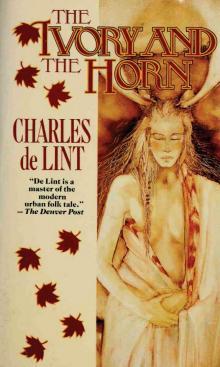 The Ivory and the Horn
The Ivory and the Horn Yarrow
Yarrow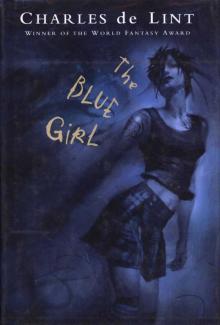 The Blue Girl
The Blue Girl Spirits in the Wires
Spirits in the Wires The Painted Boy
The Painted Boy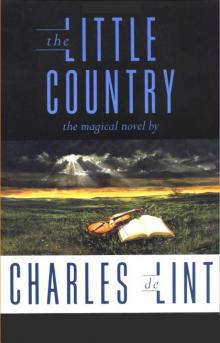 The Little Country
The Little Country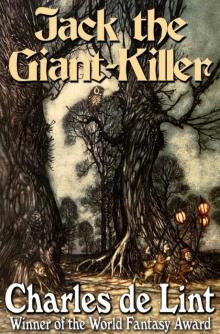 Jack of Kinrowan: Jack the Giant-Killer / Drink Down the Moon
Jack of Kinrowan: Jack the Giant-Killer / Drink Down the Moon Moonheart
Moonheart Dreams Underfoot
Dreams Underfoot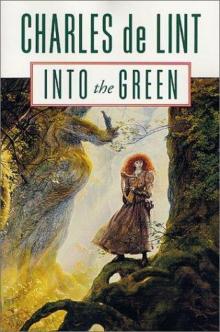 Into the Green
Into the Green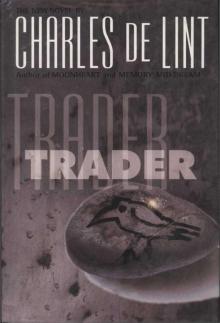 Trader
Trader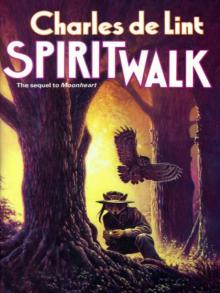 Spiritwalk
Spiritwalk Someplace to Be Flying
Someplace to Be Flying Jack in the Green
Jack in the Green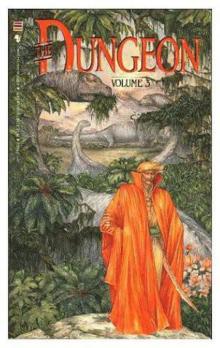 The Valley of Thunder
The Valley of Thunder Out of This World
Out of This World The Cats of Tanglewood Forest
The Cats of Tanglewood Forest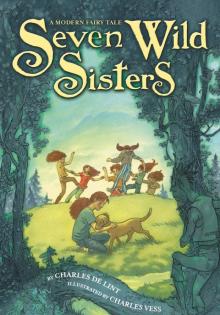 Seven Wild Sisters
Seven Wild Sisters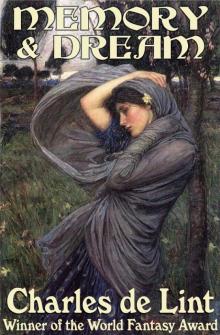 Memory and Dream
Memory and Dream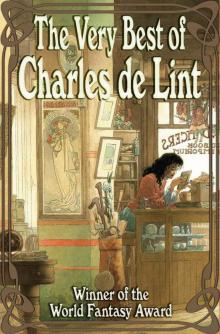 The Very Best of Charles De Lint
The Very Best of Charles De Lint Under My Skin
Under My Skin Forests of the Heart
Forests of the Heart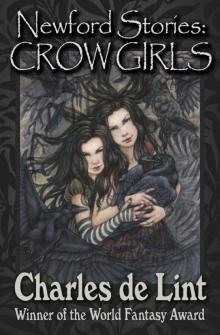 The Newford Stories
The Newford Stories Moonlight and Vines
Moonlight and Vines Angel of Darkness
Angel of Darkness The Onion Girl
The Onion Girl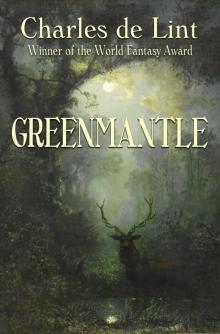 Greenmantle
Greenmantle Waifs And Strays
Waifs And Strays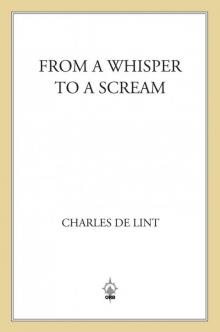 From a Whisper to a Scream
From a Whisper to a Scream Over My Head
Over My Head The Ivory and the Horn n-6
The Ivory and the Horn n-6 Our Lady of the Harbour
Our Lady of the Harbour Dreams Underfoot n-1
Dreams Underfoot n-1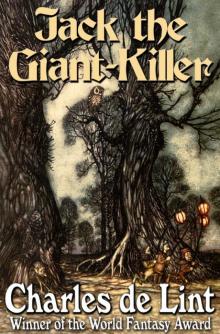 Jack the Giant-Killer (Jack of Kinrowan Book 1)
Jack the Giant-Killer (Jack of Kinrowan Book 1)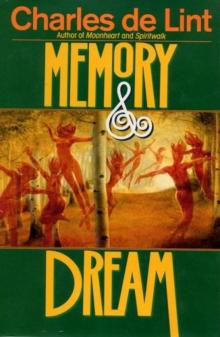 Memory and Dream n-5
Memory and Dream n-5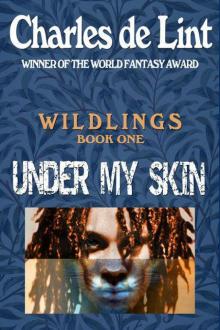 Under My Skin (Wildlings)
Under My Skin (Wildlings)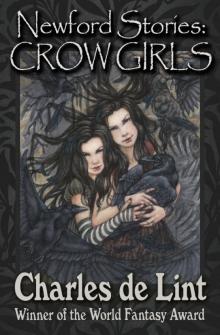 Newford Stories
Newford Stories The Wind in His Heart
The Wind in His Heart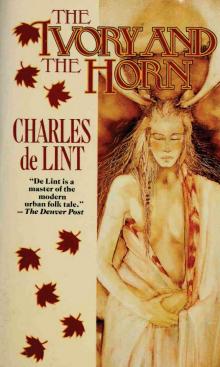 Ivory and the Horn
Ivory and the Horn